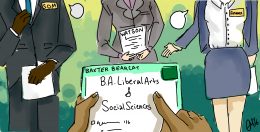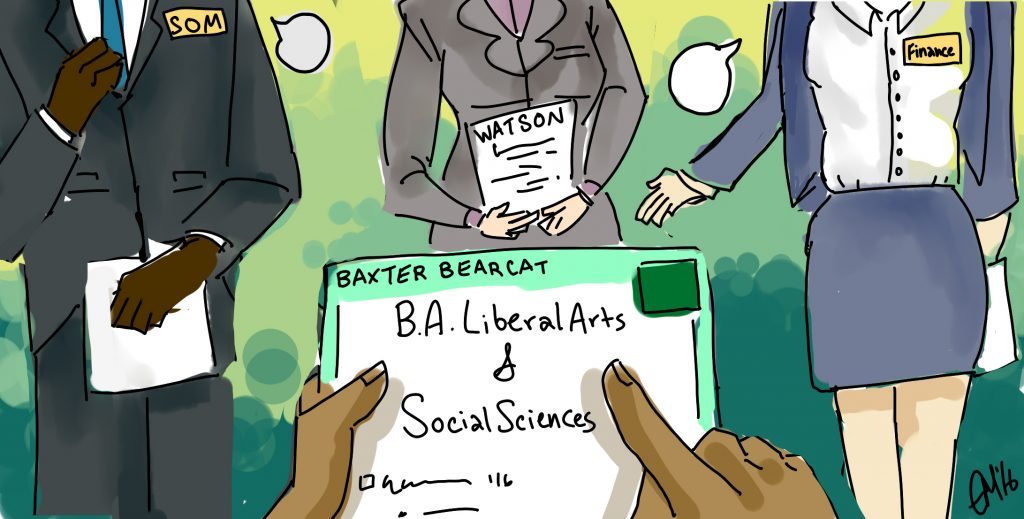
If you went to the Fall Job and Internship Fair last week, you may have experienced the indomitable pleasure of waiting in multiple lines in the Events Center for long periods of time. As a Thomas J. Watson School of Engineering and Applied Sciences student in search of employment, you may have shaken hands with a recruiter from General Electric, Lockheed Martin or Regeneron. As School of Management (SOM) job-seeker, you may have tried your shot with big-name companies like Deloitte, KPMG, PwC or Ernst & Young. Out of the 123 recruiters, there was plenty of choice for those students seeking gainful employment.
However, as a Harpur College student, you may have found the selection underwhelming. Many of the jobs offered were specifically targeted toward those majoring in hard sciences or specific business fields. In contrast, jobs for those majoring in the humanities, social sciences or other so-called “soft sciences” were poorly represented.
This phenomenon does not seem to be limited to just the career fair. University-wide, the efforts by schools such as the Watson school and SOM to connect students with jobs are simply more accessible and concrete than those by Harpur College. There are countless networking events that focus on maintaining a strong Watson and SOM job placement rate, and these opportunities do not transfer over to the rest of undergraduate students.
Perhaps this is in part due to the nature of post-liberal arts degree jobs themselves; these degree-seekers are often less directed toward specifically defined careers like being an electrical engineer or accountant, but rather fields of interest which they narrow down to a career path. Unlike pre-professional students — engineering and business majors — many Harpur College students aren’t entirely decided on what they are seeking in a career path. This makes it difficult for both the University and its students to find employment.
Nevertheless, we believe that if BU were to allocate more resources toward bringing in opportunities specifically catered to employment for those enrolled in Harpur College, the entire institution would benefit greatly. This could be done by placing more value and emphasis on the transferable skills that students gain in Harpur College, and guiding liberal arts students toward a swath of careers more extensive than “historian” and “English teacher.”
By building stronger and more defined ties to professional communities and employers, Binghamton University can create sturdier, lasting relationships with its liberal arts alumni. Alumni who were given more opportunity by BU will naturally be more willing and enthusiastic about playing larger roles in its alumni network, leading to more job connections for future students.
Binghamton University is constantly talking about its path to premier. One way that we can ensure an upward trajectory of our reputation is by building an alumni base, and boasting strong employment rates post-graduation. We must invest in our students’ job-seeking resources to build an alumni base full of individuals who will then give back to the University.
It’s time for Binghamton University to start providing more vocational resources to its students choosing to pursue liberal arts degrees. It takes the combined effort of the University and its students to vouch for the marketability of its students with liberal arts degrees — it’s an effort worth making.



